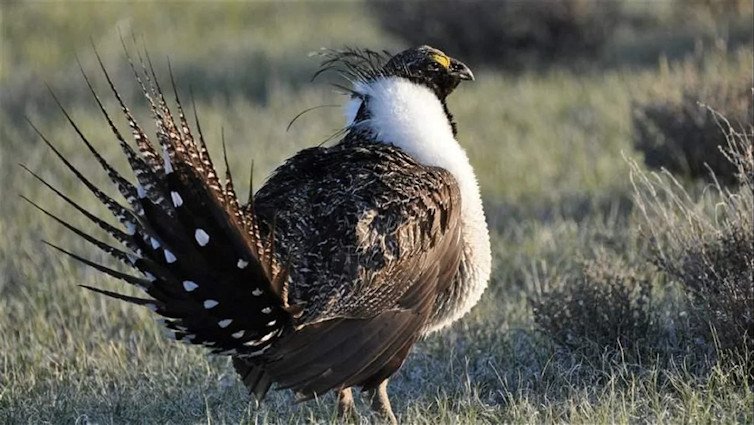BLM releases draft of stronger conservation plans for greater sage-grouse, to protect healthy sagebrush habitats

WASHINGTON (KTVZ) -- The Bureau of Land Management announced last Thursday a draft plan to strengthen greater sage-grouse conservation and management on public lands, informed by the best-available science and input from local, state, federal, and Tribal partners.
"The draft plan is built on decades of partnership, research, and on-the-ground knowledge and experience in maintaining, protecting and restoring healthy sagebrush habitats," the BLM said in a news release, which continues in full below:
Greater sage-grouse rely on sagebrush lands for all aspects of their life cycle to meet seasonal needs for food, cover and reproduction. A local population may need up to 40 square miles of intact landscape to stay healthy.
Populations once in the millions now number fewer than 800,000, largely due to habitat loss exacerbated by climate change, such as drought, increasing wildfires, and invasive species.
Protecting and restoring sagebrush on BLM-managed public lands across the West is critical not just for greater sage-grouse, but also for the health of western communities and other iconic Western species that rely on healthy sagebrush, including mule deer, pronghorn, and the pygmy rabbit.
Additionally, these collaboratively developed landscape-level plans will ensure that other multiple uses of BLM sagebrush lands – including clean energy projects – move forward in a manner that limits impacts to sensitive resources and can also help combat climate change—a main driver of greater sage-grouse habitat loss.
“The majesty of the West and its way of life are at stake. Sagebrush lands are places where people work and play, and they are the headwaters for the West’s major rivers,” said BLM Director Tracy Stone-Manning. “Joint efforts to conserve the greater sage-grouse and its habitat led to the largest collaborative conservation effort in our history, and we are building on that work, together with our partners, to ensure the health of these lands and local economies into the future.”
The BLM manages the largest single share of sage-grouse habitat in the United States — nearly 67 million acres of 145 million total acres.
The draft plan offers a range of alternatives for sustainable management of these lands. Balancing a consistent management approach across the range while addressing conditions and policies unique to individual states, BLM will be able to work more effectively with state and local managers to protect and improve sagebrush habitats on public lands.
Alternatives in the proposal build on the most successful components of the plans that the BLM adopted in 2015 and updated in 2019. The draft plan incorporates new sage-grouse conservation science and lessons learned, accommodating changing resources conditions while increasing implementation flexibility. The agency considered nearly 1,900 comments gathered during an initial public scoping period and information shared by state, local, federal, and Tribal partners in more than 100 meetings.
The BLM will hold 13 public meetings to answer questions and take further comments on the draft alternatives and analysis. Information on public meetings will be posted in the events column on the main page of the BLM website.
In addition to actions guided by the greater sage-grouse management plans, the BLM is actively restoring and conserving sagebrush habitat across the West through the Biden Administration’s Investing in America agenda.
Annually, the BLM invests approximately $35 million of its congressional appropriation in sagebrush ecosystem projects, supplemented by $123 million from President Biden’s Inflation Reduction Act and Bipartisan Infrastructure Law, and complemented by investments by state and local governments, Tribes, stakeholder groups, and private landowners.
The draft environmental impact statement and plan amendments opened for public comment on March 15. The comment period will end on June 13, 2024. More information on how to comment on this draft will be posted at https://www.blm.gov/sagegrouse. A final environmental impact statement is expected this fall, followed by Records of Decision in each state.